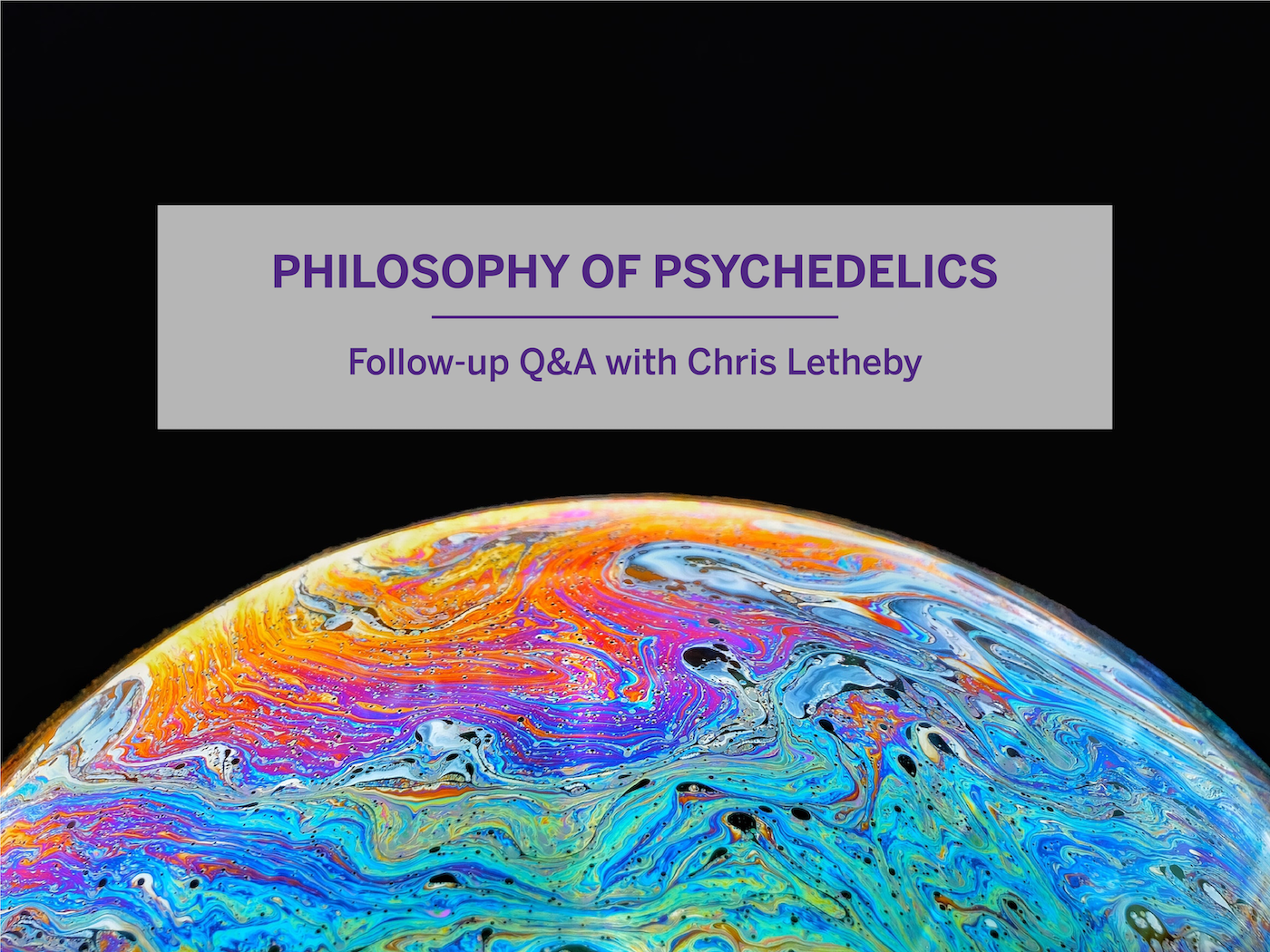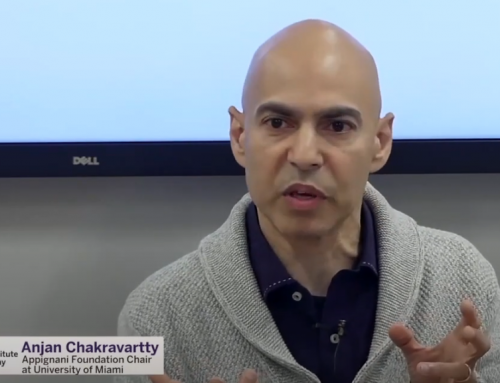Last May, Chris Letheby delivered a fascinating lecture, Philosophy of Psychedelics, as part of our Emerging Minds colloquium series. Video of his talk can be seen on the Rotman Institute YouTube channel (or via the link below).
Following the talk, attendees had an opportunity to submit written questions. Because there were more questions than we had time for, Dr. Letheby has graciously responded to a number of additional questions in writing. Note that many of his replies include links for further reading for anyone interested in learning even more about this topic.
Why is MDMA outside of your scope, when it also has proven benefits? Is it its reputation as a ‘party’ drug, or something to do with safety, or the actual chemical difference of its effect on the brain? (question submitted by Lindsay Hachey)
Chris Letheby: Simply because it’s a different type of drug. MDMA is an ‘entactogen’ and has different neuropharmacological mechanisms, and different cognitive and phenomenological effects, to the classic psychedelics such as LSD and psilocybin. Of course, MDMA-assisted psychotherapy raises philosophical issues too, and these overlap with – but aren’t identical to – those raised by classic psychedelic-assisted psychotherapy. The philosophical issues raised by MDMA have been explored a bit by Brian Earp and Julian Savulescu in the book Love Drugs, and are currently being charted by an Honours student of mine, Aidan Howitt, who is investigating the similarities and differences between MDMA therapy and psychedelic therapy from an epistemological standpoint.
Do you think that these developments support the idea that Free Will exists? Or is this evidence that Free Will can be explained away, as some kind of delusion?
Chris Letheby: I’m not sure that psychedelic evidence has any specific relevance to metaphysical issues about the existence of free will. But interestingly, it seems that people tend toward fatalistic views that deny the existence of free will after psychedelic experiences. At any rate, this is one of the findings of a new study I was involved in, that has not yet been peer-reviewed (the pre-print is here: https://psyarxiv.com/f6sjk/).
To the best of your knowledge, what constitutes the ineffability/difficulty in uttering anything during a psychedelic experience? Is it simply the doing of some neural mechanisms, or does the subject experience some sort of metaphysical confusion, perhaps a lack of truth-makers out in the world, so that one feels compelled to refrain from speaking?
Chris Letheby: I haven’t explored this particular question deeply, though philosophers have had quite a bit to say about ineffability over the years. There are different possible explanations. When it comes to full-on mystical states in which very fundamental aspects of experience, such as the subject-object distinction and the laws of logic, are said to be transcended, it’s tempting to speculate that there’s something about the very structure of language that renders it unsuitable for describing or communicating the content of such states. But on the other hand, Walter Pahnke and William Richards report that one psychedelic subject likened himself to a caveman who was transported briefly into downtown Manhattan and then returned to his cave. This simile suggests something other than an intrinsic inadequacy of language – it suggests rather that the kinds of phenomena encountered in the experience are simply too far removed from one’s ordinary linguistic and conceptual scheme, though some possible language or conceptual scheme might be adequate to them.
How do philosophical naturalists account for “the hard problem” of consciousness? In other words, what’s natural about consciousness? (question submitted by Nicholas Spiers)
Chris Letheby: Different naturalists have different views. Some, such as Daniel Dennett and Anil Seth (https://aeon.co/essays/the-hard-problem-of-consciousness-is-a-distraction-from-the-real-one), argue that the Hard Problem is a pseudo-problem, an artifact of confused ideas and ways of thinking. Others embrace Colin McGinn’s Mysterianism: the view that humans simply are not smart enough to solve the problem. My view is that the problem is real and unsolved, but that this in itself doesn’t show very much. We should keep trying to solve it. The existence of unsolved problems, even uniquely difficult ones, is a normal part of the intellectual process. Naturalists should be worried if some compelling and principled argument had been given for the view that the problem cannot possibly be solved on naturalistic assumptions, but I don’t think one has. Solving the problem, if it’s possible, will probably require some remarkable intellectual breakthrough or conceptual revolution, and of course we can’t imagine in advance what that will be like; if we could, we would thereby have made the breakthrough!
The philosophy of psychedelics right now seems to be a topic that only a select few of philosophers are interested in. Considering the dramatic benefits you discussed of psychedelic-assisted therapy, why do you think that is? Do you see the topic becoming more mainstream in academia over the next few years? (question submitted by Dylan)
Chris Letheby: Philosophers are rapidly becoming very interested in this topic. We were maybe slightly later than other disciplines in coming to the party, but besides my book, I know of at least one other sole-authored monograph, two edited collections, and several exciting research projects – including Master’s and PhD dissertations – that are currently in the works, addressing philosophical issues to do with psychedelics. The neuroscientific and psychiatric use of psychedelics provides a very concrete and topical case study in a lot of distinct phenomena that philosophers have been discussing recently: the nature of transformative experience, the epistemic credentials of unusual mental states, the possibility of selfless states of consciousness, the bioethics of moral enhancement, the prospects for a naturalistic spirituality, the taxonomy of mental disorder, and so forth. So I think this area of inquiry is about to expand rapidly, just as virtually every area of psychedelic-related inquiry has been of late.
Thanks for the interesting talk. If I followed correctly, I was wondering about your focus on the metaphysical belief theory rather than specific metaphysical beliefs. By the end when you consider the alternative you prefer it doesn’t sound like the alternative is free of metaphysical commitments either e.g. moving from a necessary sense of self view to a contingent sense of self view. So maybe all these experiences do elicit new metaphysical beliefs, but the problem is about specific metaphysical beliefs that badly fit what we know (which seems to be what P3 requires). (question submitted by Rami El Ali)
Chris Letheby: In a sense, you’re right: my main concern is about whether the therapeutic process depends on the induction of false or implausible beliefs, not whether it depends on changing metaphysical beliefs per se. On the other hand, there is a real difference. What I call the Metaphysical Belief Theory is a specific conjecture about the mechanisms of psychedelic therapy that I want to argue against. This conjecture is that the central mechanism of psychedelic therapy is the acquisition or strengthening of non-naturalistic metaphysical beliefs. Now, on my alternative account of psychedelic therapy – the self-unbinding theory – the central mechanism is the disintegration and the revision of the self-model. I think this often importantly involves acquiring a key insight that might in some sense be called metaphysical – as you say, an insight into the constructed and contingent nature of one’s sense of self. But this is just one part of the process. Equally important is becoming aware of the availability of specific, alternative forms of self-modelling – ways of seeing oneself and relating to one’s mind and life – and consolidating those as habitual new ways of experiencing the world. The insight into the possibility of change, stemming from the contingency of one’s self-model, helps this process along. So even if the process isn’t totally free of changes in metaphysical ideation, that’s not what it is centrally about. (I also am not sure to what extent this insight amounts to a change in metaphysical beliefs – but that’s another story.)
I enjoyed your talk and agree with the vast majority of your conclusions but I have a concern. Is there not a possibility that, given the perceived massive advances created by this therapy, is not possible that this may lead to people attempting to recreate this and could this not lead to drug addiction especially during possible re-lapses? (question submitted by Karl Wilson)
Chris Letheby: Thank you! I don’t think this is a worry, since classic psychedelics are regarded as non-addictive by most researchers and don’t create physiological dependence. There is a worry about careless or insufficiently cautious use leading to various harms, however. Rates of LSD use have risen dramatically in the past few years and this plausibly has at least something to do with the positive publicity surrounding the therapeutic research. Psychedelics are some of the safest drugs out there, but they still can cause serious harm, and if more positive publicity leads to more uncontrolled use, then it will almost certainly lead to more psychological or behavioural harms of one kind or another. This is certainly something we need to be aware of and take proactive steps to minimise and mitigate. (See this interesting recent reflection by Jules Evans: https://www.onecommune.com/blog/commusings-helping-people-who-have-difficult-mystical-experiences-jules-evans).
Do you think a better understanding of the phenomenology of mystical psychedelic experiences – beyond psychometric questionnaires – could help in illustrating that the psychological benefits are actually due to changes in sense of self rather than non-naturalist metaphysical beliefs? Or would that, in your view, not add much to what we already know through questionnaires? (question submitted by Umair Khan)
Chris Letheby: Absolutely – I think qualitative studies involving interviews with participants are an extremely important source of evidence. These studies play a crucial role in my argument that the benefits are owed more to changes in the sense of self than to changes in metaphysical beliefs. There is a good review of qualitative studies by Breeksema et al.: https://link.springer.com/article/10.1007/s40263-020-00748-y
Do you think that researchers using the Hood Mysticism scale have influenced people’s interpretation/integration of their experiences? Not that they weren’t meaningful in terms of connectedness or self representation changes—but that it colored the experience as more metaphysical than it might have been without asking questions about “unity” and “sacredness”.
Chris Letheby: I’m sure this has happened. This is a real methodological worry that’s hard to know how to deal with. Balancing psychometric measures with qualitative evidence, as discussed in the previous question, is one possibility. Another option is digging more deeply into the psychometrics, trying to develop new, more fine-grained measures and figuring out what really are the best predictors. But of course you’re never going to get around this problem entirely – any questionnaire is going to suggest framings to some people that they wouldn’t have come up with themselves. An interesting recent discussion of this issue: https://doi.org/10.1021/acsptsci.1c00097
Are there any participant profiles that either had negative effects or were likely to experience positive effects? I’m thinking people who already have personality traits such openness to experience, but other traits or disorders or disabilities that have been linked to negative effects? (question submitted by Dominique)
Chris Letheby: Generally psychedelics are regarded as contra-indicated for anyone with a personal history, or an immediate family history, of schizophrenia, bipolar, or any kind of psychotic disorder. A bit is known about factors predicting different types of experiences: people high in the personality trait Absorption seem to have more intense and more mystical experiences under psychedelics, and a “state of surrender” at the time of ingestion is associated with positive and beneficial experiences. And one study found that people reporting a religious affiliation scored higher on the mysticism scales. However many of these are survey-based studies looking at use in non-clinical settings.
Is there a way in clinical trials to compare the effects against a placebo group?
Chris Letheby: This is one of the biggest methodological challenges facing the field today. One approach taken in some trials is to use an ‘active placebo’ – a drug that has some common effects to the active treatment – but even then, the blind is broken a lot of the time. This is one area where philosophical and conceptual reflections might help to move the scientific work forward. In a very interesting Philosophy Master’s thesis, Andrew Jones has suggested that ideas from the philosophy of medicine about “mechanistic evidence” might be relevant to solving these problems in psychedelic research (https://open.library.ubc.ca/cIRcle/collections/ubctheses/24/items/1.0371155).
I wonder if committing yourself to an acceptance of the importance of the epistemic status of your beliefs, down the road causes a small challenge for your preferred account of therapeutic mechanism: We can talk about healthier and less healthy self-models, but this seems to be just instrumentalising the value of these self-models. Self-models do seem to have some truth-aptness to them (that’s part of what’s lacking when people are grandiosity deluded, for example). But then isn’t the epistemic safety of psychedelic-induced challenged again: some of the ‘new’ self-models are going to be less true than before. Is it a choice of rejecting the truth-aptness of self-models, or accepting a certain level of epistemic fault (in which case, why not just commit to ‘it doesn’t matter if the therapeutic mechanism involves some belief in falsehood’?) (question submitted by Eddie Jacobs)
Chris Letheby: This is a really important point. I spend a bit of time in the book arguing that psychedelics are likely, often, to throw up accurate insights about the self. There are documented commonalities between the psychedelic state and mindfulness practice, and there is evidence that mindfulness practice improves introspective accuracy. There are some tentative reasons grounded in the predictive processing account of psychedelics’ effects to think that they will often lead one to new and accurate self-related insights. And there is always the integration period in which patients should evaluate their apparent self-related insights critically with the help of a therapist. Of course, I don’t claim that psychedelic therapy, on the self-unbinding account, is epistemically flawless. But I claim that it’s epistemically better than it would be if the Metaphysical Belief Theory were true, and that this is a good thing.
Another important point is that, while self-models are somewhat truth-apt, they are also apt – especially given predictive processing assumptions – to be self-fulfilling prophecies. Take for instance the alcoholic who has a psilocybin experience that leads her to see, for the first time, a clear vision of what a life without drink could be like. She gets a taste of a new form of self-modelling, a new way of conceiving of herself. Now, she is not deluded – she realises that this new self-conception doesn’t accurately reflect the way that she has been living or behaving. But she gets a genuine insight into the fact that this new way of being is possible – that it is available to her – and that this is so, in part, because her previous, in some sense more accurate, self-model, does not in fact reflect something essential or unchangeable about her. This is where the insight into the mutability of the self-model comes in, though perhaps that’s too limiting a way of putting it. Perhaps anti-essentialism about the self, or the person, really is the key insight – and so perhaps changes in metaphysical beliefs are central on my account after all!






